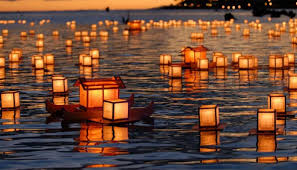The Obon Festival, also known simply as Obon, is a traditional Japanese Buddhist event that honors the spirits of ancestors. It is one of the most significant cultural events in Japan, deeply rooted in the customs and beliefs of the people. Typically held in mid-August, Obon involves family reunions, visiting ancestral graves, and participating in traditional dances called Bon Odori. However, the onset of the coronavirus pandemic has profoundly impacted how this festival is celebrated. This article explores the latest developments and the ways in which the Obon festival has adapted during the ongoing pandemic, reflecting on the cultural, social, and economic ramifications.
The Significance of Obon Festival

Obon Festival has been celebrated in Japan for over 500 years and is traditionally a time for families to gather and pay respects to their ancestors. The festival lasts for three days and is marked by various rituals, including cleaning graves, offering food and prayers at altars, and participating in communal dances. The event is not only a time for spiritual reflection but also a moment for family members to reconnect, often traveling long distances to return to their hometowns.
The festival is also associated with a spiritual belief that during Obon Festival, the spirits of deceased ancestors return to the world of the living. Lanterns are lit to guide the spirits, and families make offerings of food and drink to welcome them. The festival culminates in the Toro Nagashi, a ceremony where lanterns are floated down rivers to send the spirits back to the afterlife.
The Impact of the Coronavirus Pandemic
The coronavirus pandemic has drastically altered the way people across the world conduct their daily lives, and traditional festivals like Obon are no exception. Since the onset of the pandemic, Japan, like many other countries, has faced waves of infections, leading to various public health measures, including lockdowns, travel restrictions, and social distancing protocols. These measures have had a significant impact on the celebration of Obon, leading to changes in both the scale and manner of observance.
Travel Restrictions and Family Reunions

One of the most profound impacts of the pandemic on Obon Festival has been the imposition of travel restrictions. Traditionally, millions of people travel across Japan during Obon to return to their hometowns. This mass movement of people has been a concern for health authorities, given the potential for spreading the virus, especially in rural areas with older populations.
In recent years, the Japanese government and health officials have issued guidelines and requests for people to avoid unnecessary travel during Obon to prevent the spread of the virus. Many families have had to cancel their trips home, leading to a significant reduction in the number of people visiting their ancestral graves. This has been a difficult adjustment for many, as the act of returning home during Obon is a deeply ingrained cultural practice.
Virtual Obon Celebrations
In response to the challenges posed by the pandemic, many families and communities have turned to virtual platforms to celebrate Obon. Online memorial services, virtual grave visits, and digital Bon Odori dances have become more common. Temples and local governments have set up live streams of traditional ceremonies, allowing people to participate from a distance.
These virtual celebrations have helped maintain a sense of connection and continuity during a time when physical gatherings are limited. While not a perfect substitute for in-person rituals, virtual Obon activities have provided a way for people to honor their ancestors and stay connected with their cultural heritage.
Economic Impact on Local Communities
Obon Festival is not only a spiritual and cultural event but also an economic one. The festival typically brings significant economic activity to local communities, especially those in rural areas where many people return to their hometowns. Businesses such as hotels, restaurants, and shops often see a surge in customers during the festival period.
The pandemic has severely impacted this economic aspect of Obon Festival. With fewer people traveling, many businesses have experienced a downturn in revenue. Local economies that rely on the influx of visitors during Obon have been hit hard, leading to financial strain for many small businesses and local vendors.
Some communities have attempted to adapt by promoting local tourism to residents who live nearby, encouraging them to support local businesses. However, the overall economic impact remains significant, with many areas struggling to cope with the loss of income traditionally generated during Obon.
Social and Cultural Ramifications

The changes to Obon Festival brought about by the coronavirus pandemic have also led to broader social and cultural ramifications. The festival is a time for social bonding, not just within families but also within communities. Bon Odori dances, for example, are communal events that bring people together in a shared celebration of culture.
The restrictions on gatherings and the shift to virtual events have altered these social dynamics. While technology has provided a way to stay connected, it cannot fully replicate the experience of being physically present with loved ones. This has led to feelings of isolation for some, particularly the elderly, who may not be as comfortable with digital communication.
Moreover, the pandemic has prompted a reflection on the role of traditional festivals in modern society. The adaptations made during this time have sparked discussions about how cultural practices can evolve in response to changing circumstances while still preserving their core values.
The Future of Obon in a Post-Pandemic World
As the world continues to navigate the challenges of the coronavirus pandemic, questions remain about the future of traditional festivals like Obon Festival. The adaptations made during the pandemic, such as virtual celebrations, may have lasting effects on how the festival is observed in the future.
There is a possibility that some of these changes could become permanent, especially if they prove to be convenient or appealing to younger generations. The use of technology in religious and cultural practices may continue to expand, offering new ways to participate in and experience traditional events.
At the same time, there is likely to be a strong desire to return to in-person celebrations once it is safe to do so. The sense of community and shared experience that comes with physical gatherings is an integral part of situstoto Obon Festival, and many people will want to reclaim that aspect of the festival.
Conclusion Obon Festival
The Obon festival is a cherished tradition in Japan, deeply rooted in the country’s cultural and spiritual heritage. The coronavirus pandemic has brought about significant changes to how Obon is celebrated, impacting travel, family reunions, local economies, and social interactions. While these changes have posed challenges, they have also led to new ways of observing the festival, reflecting the resilience and adaptability of the Japanese people.
As the world moves towards a post-pandemic future, the experience of Obon during this time will likely influence how the festival is celebrated in the years to come. Whether through a return to traditional practices or the continued incorporation of new approaches, the essence of Obon—honoring ancestors and connecting with family and community—will remain a central part of the festival.
Read More Article About “The Latest Benefits of Yoga: A Comprehensive Exploration“

